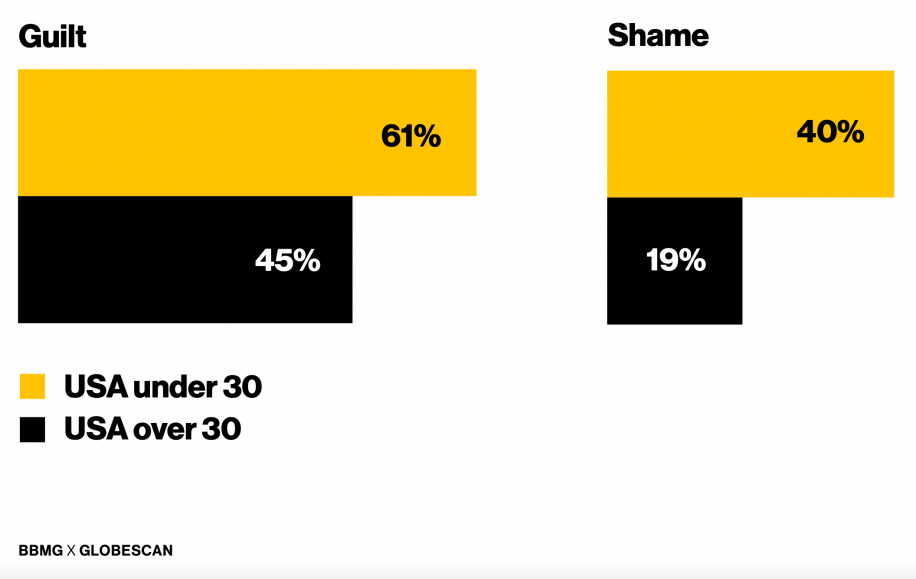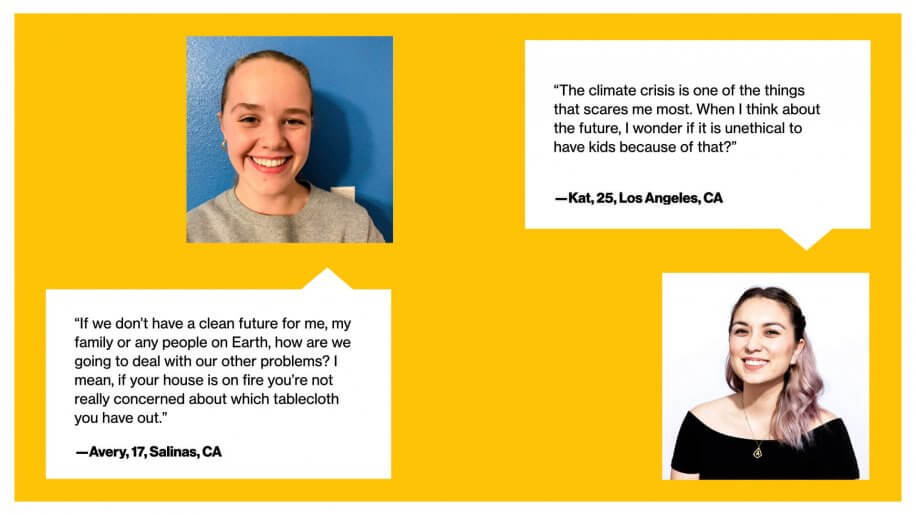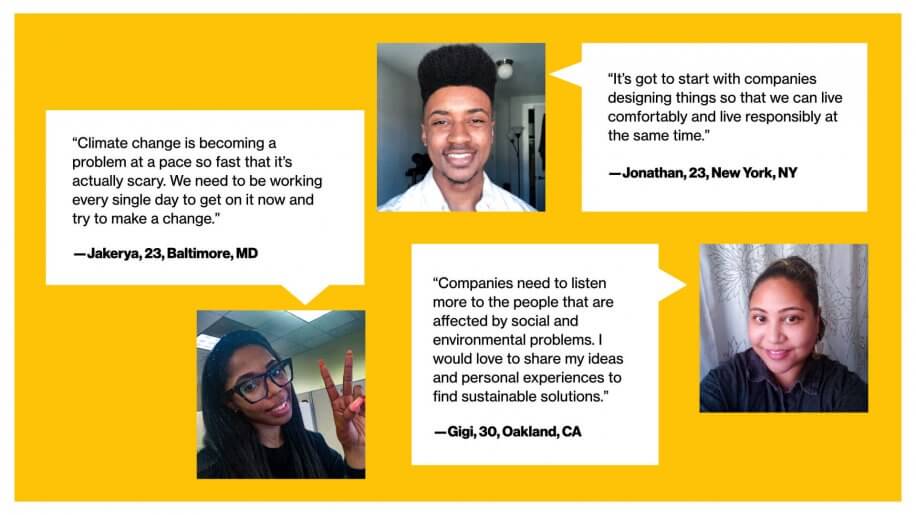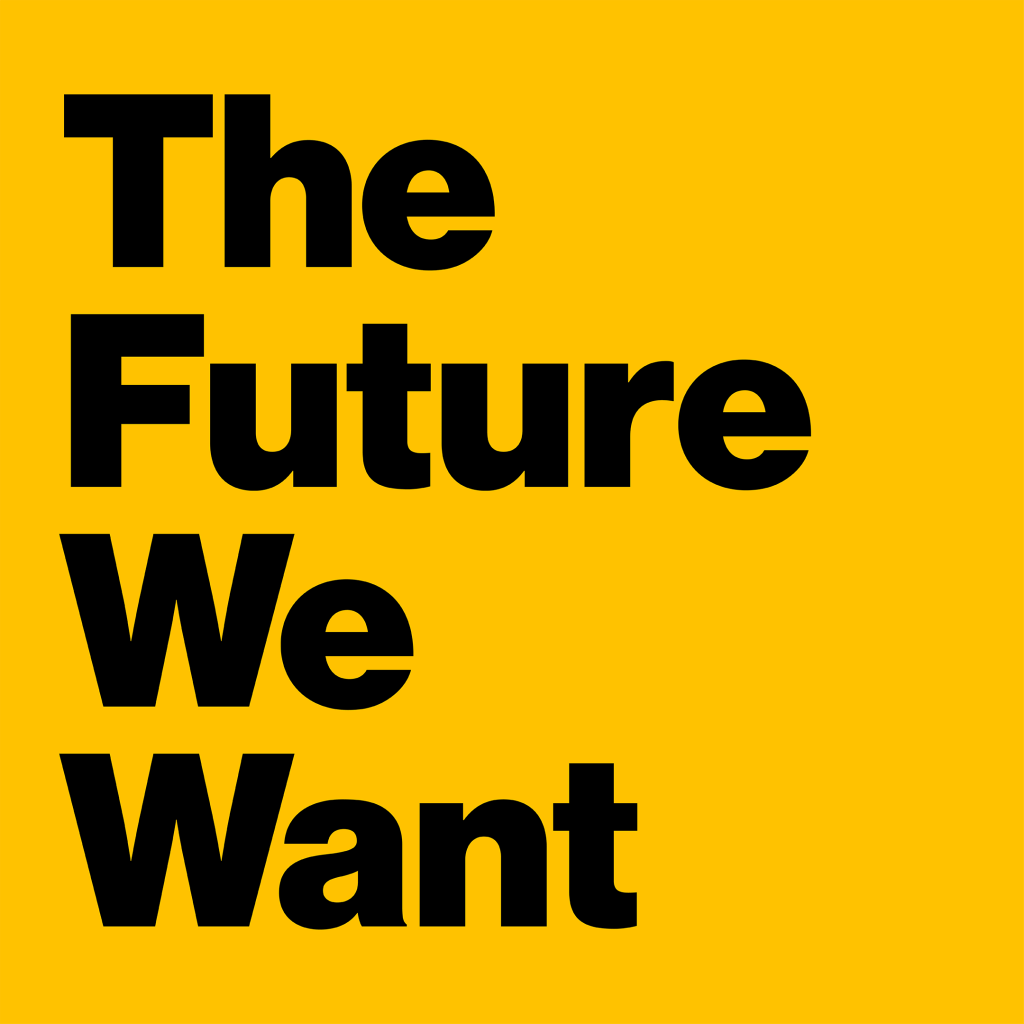Climate Change Guilt and Next Gen Action

Skip the guilt trip. Young people want brands to empower action on climate change.
When Greta Thunberg gave up air travel to show her commitment to fighting climate change, the response was mixed. Even though the young climate activist inspired millions through her example, others felt scolded and lashed out in response. The Swedes even coined a term: flygskam – the feeling of shame about flying.
Making people feel guilty about their impact on global climate change, or any other social issue for that matter, is a fine line. While people must be aware of a problem in order to care enough about it to change their behavior – or demand change from our institutions – guilt can quickly backfire. Especially if you’re asking people to give something up without offering anything in return.
“It’s deeply painful to face what’s happening on our planet right now,” says climate psychologist Renée Lertzman. “It’s easy to feel totally overwhelmed. Maybe a bit helpless. Powerless. Angry. On fire. Numb. Disconnected. Perhaps all of the above.” She goes on to explain how when that happens, we actually lose our capacity to be integrated, resilient, adaptive.
“When we’re scared, we can freeze,” Susan M. Koger, a professor who teaches and writes about psychology for sustainability, tells the BBC. “Guilt is not a useful emotion because guilt is not motivating. But instead of guilt, we can reframe it as responsibility.”
Responsibility is a complex emotion though, too. Because while individual actions do add up, young people are upset about inheriting a harmful system of capital and consumption that they did not design. “I think the narrative of personal responsibility around climate change has been destructive,” says journalist Tatiana Schlossberg, the young author of Inconspicuous Consumption. “It makes us turn inward and focus on ourselves as the cause of the problem, and lets those who are actually responsible (fossil fuel companies, their lobbyists, and the politicians who take money from them to name a few) off the hook. I don’t think we should feel individually guilty for climate change, but I think we should all feel collectively responsible for building a better world.”
Young people, from climate activists in the streets to the people BBMG interviewed in our research, are demanding that corporations take on their fair share of that responsibility, too. “I am still going to do my best to tread lightly on this planet and align my actions with my ethics,” writes Michaela Barnett, a young editor at Behavioral Scientist. “But I am also going to stop feeling guilty, and instead turn my guilt into anger at the powerful corporations who have designed a system that fails us and the Earth.”
As brand leaders, how do we eschew the guilt trip and instead capture that sense of motivation toward collective action?
A Rising Generation Seeks Change
You would think young people have less to be ashamed of – they did not engineer this world – but they are growing up more aware of the impact of our lifestyles. In BBMG and GlobeScan’s recent global study, people under 30 emerged as highly attuned to the effects and tensions of climate change.

Climate Guilt & Shame: In the USA, young people are nearly 1.5X more likely to say they “feel guilty about my negative impact on the environment” (61% to 45%, respectively), and 2X more likely to say they have often “felt ashamed about living a lifestyle that is not environmentally-friendly” over the past year, compared to older generations (40% to 19%, respectively).
Lifestyle Tension: Young people in the USA are significantly more likely to say that “what is good for me is often not good for the environment” (57% under 30, 43% over 30) and nearly 2X as many youth strongly agree vs over 30 (26% to 14%).
Growing Concern, Accelerated by COVID: Across age groups and geographies, climate change is the most serious global problem after COVID, and its seriousness has spiked in the USA from 61% of people naming it as a serious problem in 2014 to 81% feeling that way in 2020.
This anxiety showed up in our conversations with young people in the USA, 68% of whom reported they have been greatly or moderately affected by climate change personally.

And yet, in spite of the fear, guilt, and anger, we also heard a strong thread of motivation to take action – particularly if brands can help make change possible. 85% of people under 30 globally say they are interested in sharing ideas with companies to help them develop better solutions to social and environmental problems.

Advice from a Gen Z Activist
Earlier this year BBMG joined with Sustainable Brands to host a conversation with young people about their personal experiences of the moment we’re living through, and their expectations of brands. One of our panelists was Sophie Anderson, a 17-year-old organizer with Extinction Rebellion Youth, the youth wing of the global environmental movement aimed at using nonviolent civil disobedience to compel government action on climate change.
We framed the conversation around what it means to build a Regenerative Brand – a brand that is aware, additive, and alive. In Sophie’s words…
Be Aware: Take a systems lens to your impact, and make commitments that serve our deepest needs
“The best thing that companies can do is commit to net zero and really limit their fossil fuel emissions. But I think that that’s the first step. And then after that I think that a big piece is transparency about practices, both in relation to the climate piece but also connecting the issue of climate change to issues like workers rights and other things like that.”
Be Additive: Give more than you take
“Think about the impact that your company is having. Is it just kind of a neutral impact, or is it an actual positive impact? And I think in terms of brands’ roles right now in this time, every brand should be working to inspire good in the world and not just offset the bad.”
Be Alive: Invite a transparent conversation in culture
“Being very transparent about your practices, holding your company accountable, creating standard practices, and communicating that to the public are all a really important step for brands. Because it’s really hard for someone like me to do my work if I don’t know where a brand falls on a spectrum of things. Because you can say very easily that you believe in climate change and that you’re taking action, but if you don’t publicize any of that it’s very hard to tell if you’re actually walking the walk, or if you’re just declaring something on your Instagram story.”
For Sophie, it all adds up to a future where people can be joyous. Where people live in community, know their neighbors, and where brands are connected to and working with local organizers to affect positive change.
Brands Can Help Restore Our Earth
If brands take a regenerative approach, it builds trust and welcomes participation. And importantly it shares the burden of responsibility so that together we can build a better future. When a brand like McDonald’s says we’ve been part of the single-use waste problem, now help us design out waste and try our reusable cup, or Seventh Generation backs the Green New Deal Network’s THRIVE agenda and helps consumers petition their legislators, or The North Face Renewed says buy this refurbished jacket because it’s ready for more exploration, consumers don’t feel shamed, they feel excited and invited to be part of a better way of living.
This year’s Earth Month theme, Restore Our Earth, is saying we can’t go back to business as usual. In that sense restore is to regenerate, to create something new. The world needs Regenerative Brands.


